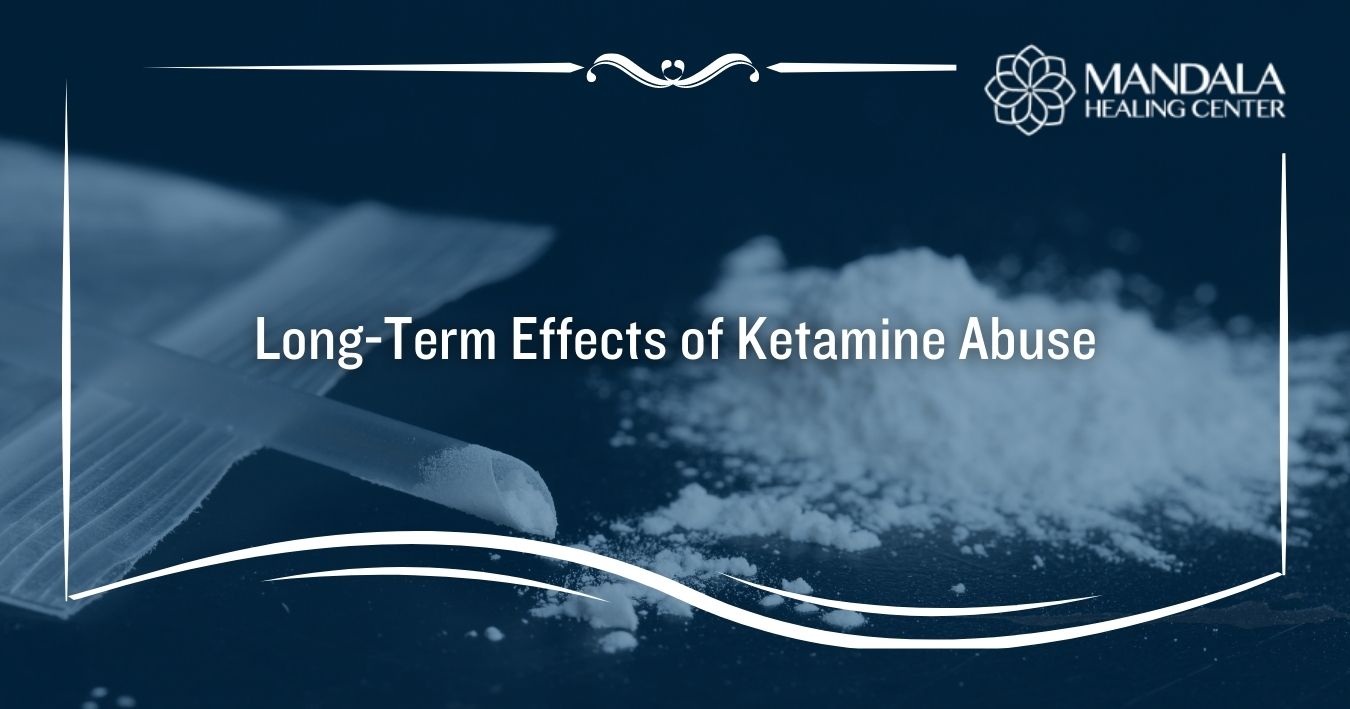Ketamine is a drug initially used for anesthesia and sedation in veterinary and medical practices and is currently being explored as a treatment for various medical and mental health conditions. People may also use Ketamine recreationally–meaning without a prescription or to treat a medical condition–for its sedating and dissociative effects.
Recreational ketamine use has many immediate and long-term risks. If you or someone in your life needs help to stop using Ketamine or other substances, help is available. Reach out to the Mandala Healing Center staff now to explore our holistic addiction treatment programs and find support for your recovery journey.
What is Ketamine?
Ketamine is a dissociative drug that has been used as an anesthetic in medical and veterinary procedures since the 1970s. The drug distorts people’s sensory perceptions and gives users a feeling of detachment or separation from themselves and their environment.
In 1999, the DEA classified ketamine as a Schedule III drug, meaning that it is illegal to use it outside a medical setting.
Despite being illegal for recreational use, people sometimes divert ketamine from veterinary clinics and use or sell it outside its intended purpose. In recent years, ketamine has become popular as a club drug favored for its dissociative effects. Once someone has ingested ketamine, they may feel its effects within minutes. Effects can last for several hours or, in some cases, several days.
While people may use ketamine recreationally for its pleasurable side effects, there are often short-term, unwanted side effects from using this drug. Some of the short-term, adverse effects of ketamine include:
- Confusion
- Disorientation
- Dizziness
- Nausea and vomiting
- Visual and auditory hallucinations
- Poor coordination
- Increased heart rate
- High blood pressure
- Increased body temperature
- A feeling of detachment from yourself and the environment
People who use ketamine may also experience psychological effects that can include:
- Difficulty maintaining attention
- Memory loss
- Paranoia
- Anxiety
- A sense of uneasiness
- Feeling as though you do not exist
These unpleasant effects can appear even after ingesting low doses of this potent drug. There is no safe dose of recreational ketamine, and all recreational ketamine use is considered drug misuse.
People who use ketamine recreationally may also use other drugs, such as MDMA, cocaine, or methamphetamines, at the same time. This increases the likelihood of dangerous side effects and long-term harm.
What are the Long-Term Effects of Ketamine Abuse?
Recreational ketamine use is relatively new, and more research is needed to explore the long-term use of this and other dissociative drugs. Mental health and addiction experts have examined ketamine use and found that it can lead to features of dependence like other drugs, including:
- Tolerance
- Physical dependence
- Ketamine withdrawal symptoms when a person stops taking it
In 2022, a survey of research showed that long-term ketamine use may change the way a person’s brain functions and its structure. There is also evidence that long-term ketamine use may lead to declines in cognitive functions and depression.
The National Institute on Drug Abuse (NIDA) has linked long-term ketamine use to delayed physical and cognitive effects that include:
- Bladder pain
- Kidney problems
- Ongoing stomach pain
- Ulcers in the bladder
- Long-term memory deficits
People who use ketamine recreationally must seek treatment to address the physical, behavioral, and psychological aspects of their substance abuse and learn tools to work toward a lifetime of sobriety. Without getting help, substance abuse may become an addiction or lead to long-term, life-altering mental and physical problems.
Recognizing Ketamine Abuse and Addiction
People who use ketamine report short-term euphoric effects that can make them want to use it more. Some evidence shows ketamine use can lead to physiological and psychological dependence over time. Many users struggle to stop taking ketamine, even when experiencing unfavorable effects or long-term harm.
Recognizing the signs of ketamine abuse and addiction early can help you get the treatment you need to stop using this drug safely and avoid relapse for life. Some of the common signs of ketamine abuse and dependence include:
- Using larger or more frequent doses of ketamine over time or using it for longer than you intended
- Wanting to stop but not being able to
- Spending a lot of time and energy thinking about, getting, using, and recovering from using ketamine
- Neglecting personal responsibilities, hobbies, hygiene, or relationships because of substance use
- Legal, financial, or health consequences related to ketamine use
- Continuing to use ketamine despite the negative effects it has on your health, relationships, and other essential aspects of your well-being
If you or someone you know uses ketamine, it’s crucial to get help right away to avoid the long-term risks and effects of this potent, illicit drug.
Find Treatment for Ketamine Abuse and Addiction
If you or someone you love struggles with ketamine use, you are not alone. Compassionate, effective treatment is just a phone call away. Reach out to the Mandala Healing Center specialists now to explore our holistic treatment programs or find support during any stage of your recovery journey.
You deserve help. Call us today to get started.
References:
- Drug Enforcement Administration (DEA): Ketamine, Retrieved August 2023 from https://www.dea.gov/factsheets/ketamine
- National Library of Medicine: Ketamine, Retrieved August 2023 from https://www.ncbi.nlm.nih.gov/books/NBK470357/
- Harvard Health Publishing: Ketamine for treatment-resistant depression: When and where is it safe? Retrieved August 2023 from https://www.health.harvard.edu/blog/ketamine-for-treatment-resistant-depression-when-and-where-is-it-safe-202208092797
- National Library of Medicine: Brain Changes Associated With Long-Term Ketamine Abuse, A Systematic Review, Retrieved August 2023 from https://www.ncbi.nlm.nih.gov/pmc/articles/PMC8972190/












